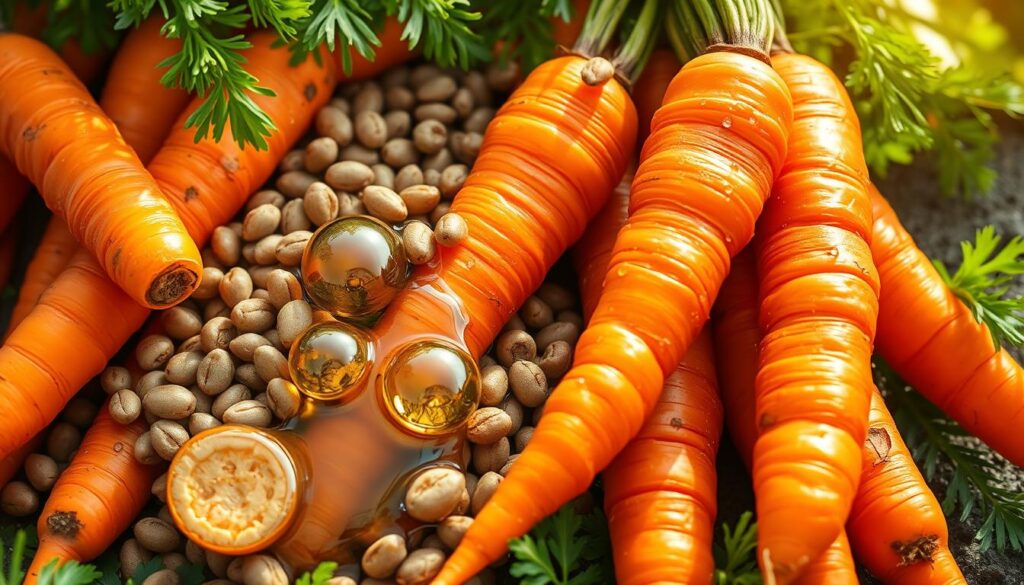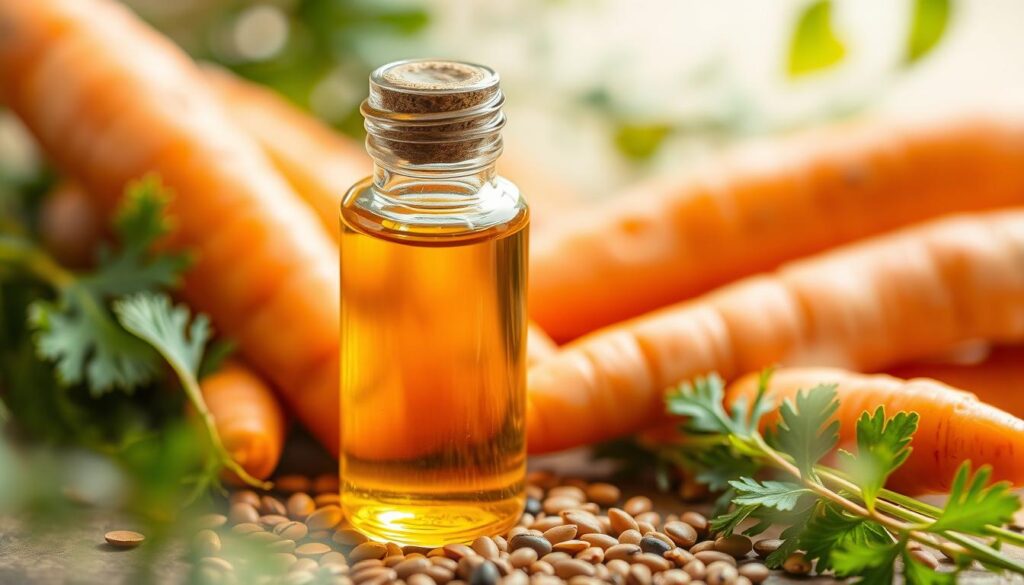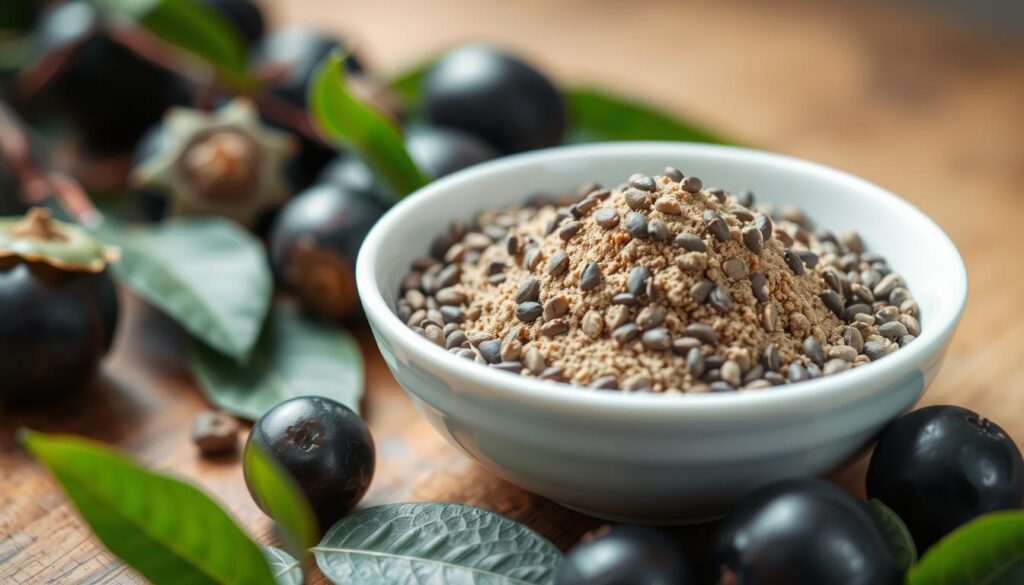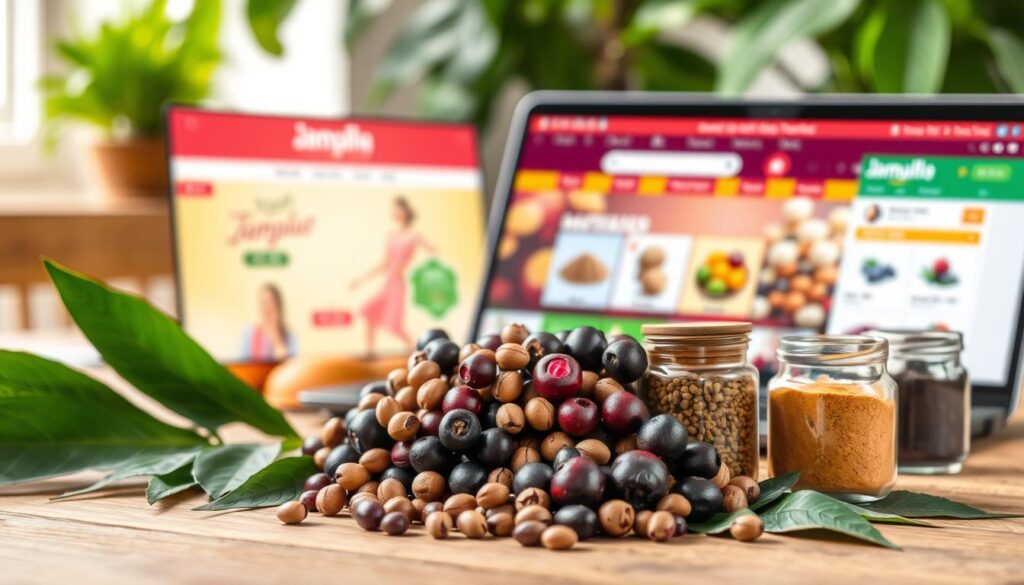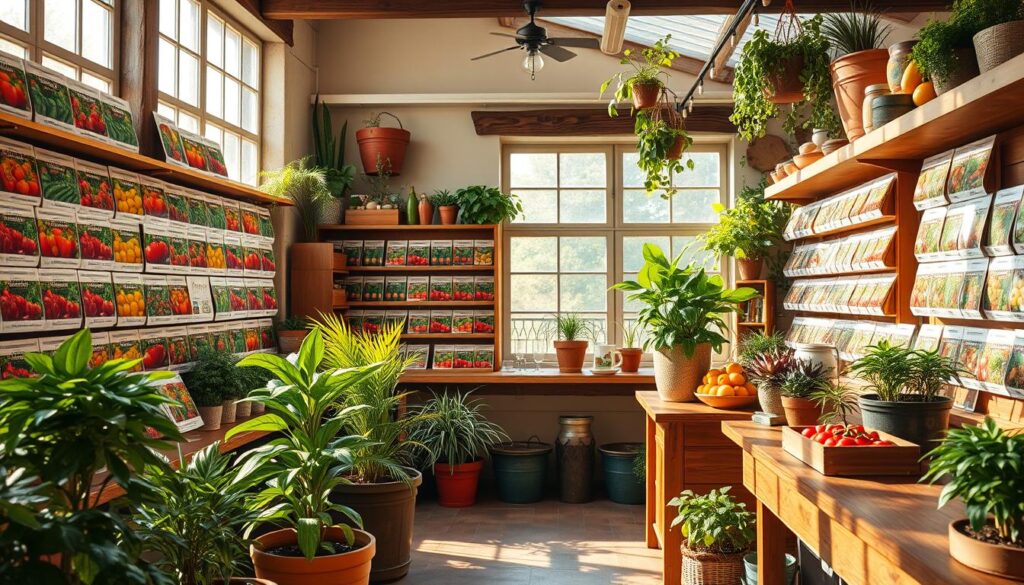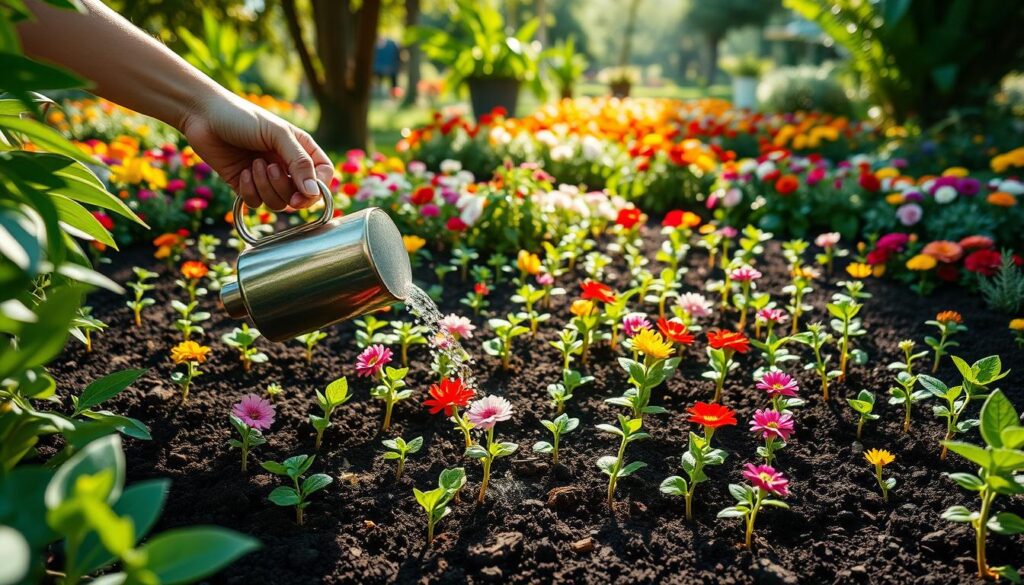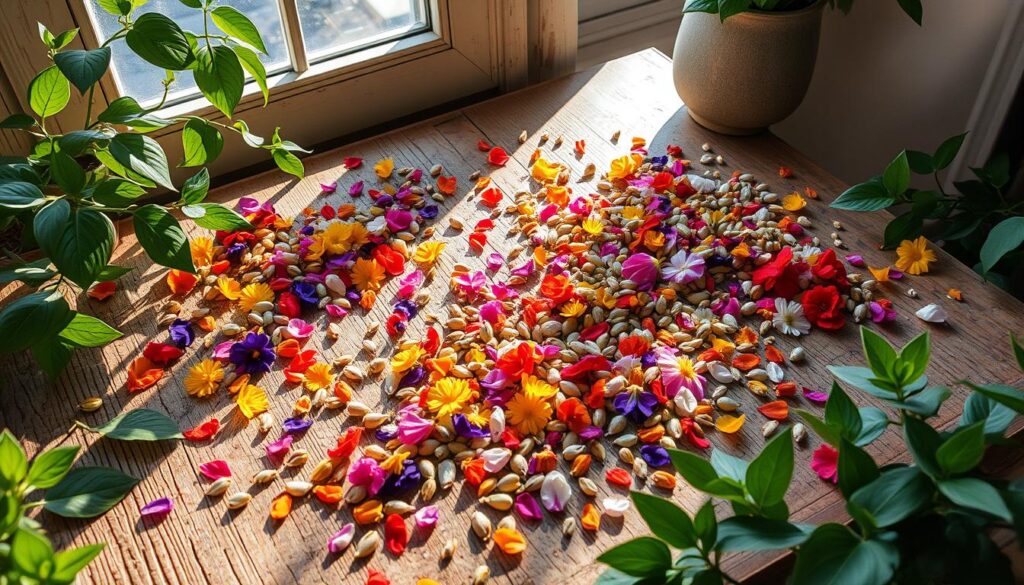Ever wondered how to grow cherry tomatoes from tiny seeds? I’m here to show you how to turn these small seeds into a big harvest of sweet fruits. Growing cherry tomatoes is easy and very rewarding for gardeners.
Starting with cherry tomato seeds is a fun way to grow organic vegetables. It doesn’t matter if you’re new to gardening or have been doing it for years. Learning how to care for tomato plants can help you grow a great crop in your garden or on your windowsill.
Cherry tomatoes are a favorite in many gardens. They’re full of antioxidants and vitamins, making them a great choice for a healthy diet. With the right care, one plant can produce up to 75 tomatoes.
If you’re ready to start growing cherry tomatoes, you might wonder where to find the best seeds online. Don’t worry, I’ll guide you on choosing the right varieties for your garden and climate.
Key Takeaways
- Cherry tomatoes can be grown from seeds or seedlings, with seeds taking about 2 weeks longer to flower.
- Plants need at least 8 hours of direct sunlight daily for good fruit production.
- A 4-6 gallon container is ideal for growing cherry tomatoes.
- Water cherry tomato plants every 2-3 days, providing 1-2 inches of water per week.
- Fertilize weekly with organic fertilizer to avoid root burn.
- Cherry tomato seeds typically germinate in 7-14 days and produce fruit in 60-70 days after planting.
- March, April, and May are the best months to plant cherry tomatoes.
Getting Started with Cherry Tomato Seeds
Starting your cherry tomato garden is an exciting journey. Choosing the right seeds and understanding how to grow them are crucial for a great harvest. Let’s explore the basics of growing these tasty fruits.
Choosing the Right Cherry Tomato Varieties
I always pick heirloom cherry tomato seeds for their flavor and yield. ‘Amish Salad’, ‘Camp Joy’, and ‘Sungold’ are top choices. They are known for their great taste.
Understanding Seed Germination
Cherry tomato seeds germinate in 6-8 days. I plant them in early spring, making sure they grow to about 4 inches before moving them outside. This process takes about four weeks. For the best growth, keep plants at least 2 feet apart.
Preparing Your Growing Space
To make the best environment for cherry tomatoes, I add composted poultry manure to the soil. This boosts plant health. I also cover the soil with black plastic to warm it and control weeds and diseases.
| Aspect | Details |
|---|---|
| Planting Season | August to March |
| Germination Period | 6-8 days |
| Transplant Readiness | 4 weeks after sowing |
| Plant Spacing | Minimum 2 feet apart |
By using these tips and organic seeds, you’ll grow a great cherry tomato garden. Remember, taking good care of your plants from seed to harvest leads to a bountiful and tasty crop.
Planting and Nurturing Your Cherry Tomato Seeds
Planting cherry tomato seeds is a fun journey. This guide will help you grow these seeds into healthy plants. Let’s explore how to care for these tasty fruits.
Optimal Soil Conditions for Seed Starting
Cherry tomatoes prefer soil that drains well and is full of nutrients. I keep the soil’s pH between 6.0 and 6.8. Adding compost or aged manure boosts fertility. For gmo-free seeds, using organic materials is important.
| Soil Component | Ideal Range | Benefits |
|---|---|---|
| pH Level | 6.0 – 6.8 | Optimal nutrient absorption |
| Organic Matter | 5 – 10% | Improves soil structure |
| Drainage | Well-drained | Prevents root rot |
Proper Watering Techniques
Keeping the soil moist is crucial for seeds to germinate. I water gently to not disturb the seeds. Once they grow, I keep the soil moist but not too wet. Cherry tomatoes need about 1 to 2 inches of water each week, depending on the weather.
Providing Adequate Light and Temperature
Cherry tomatoes need 6-8 hours of sunlight a day for best growth. I start seeds indoors 6-8 weeks before the last frost. The best temperature for germination is 85°F. Once seedlings have true leaves, I slowly introduce them to the outdoors.
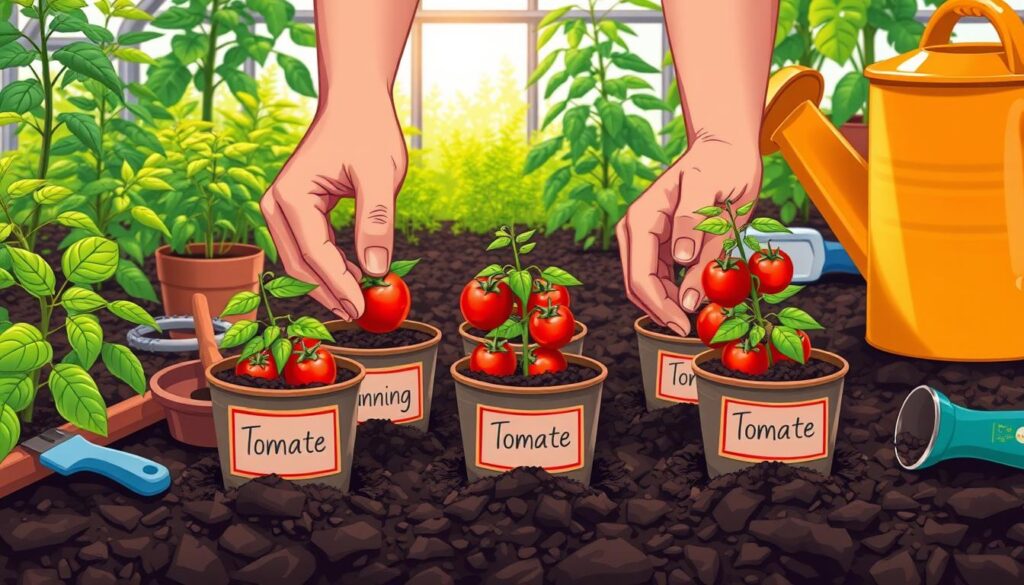
Follow this guide to grow delicious cherry tomatoes. Remember, patience and care are essential for these quick-growing seeds.
Cherry Tomato Seeds: From Seedlings to Mature Plants
Growing cherry tomatoes from seeds is a rewarding journey. Top-rated cherry tomato seeds like Cheramy give great results. Buying cherry tomato seeds in bulk means a big harvest.
After germination, which takes 6-12 days, it’s time to transplant seedlings. I wait until two weeks after the last spring frost, when soil warms up. Spacing is key – I put plants 18 inches apart or 3-4 in an 8-foot panel.
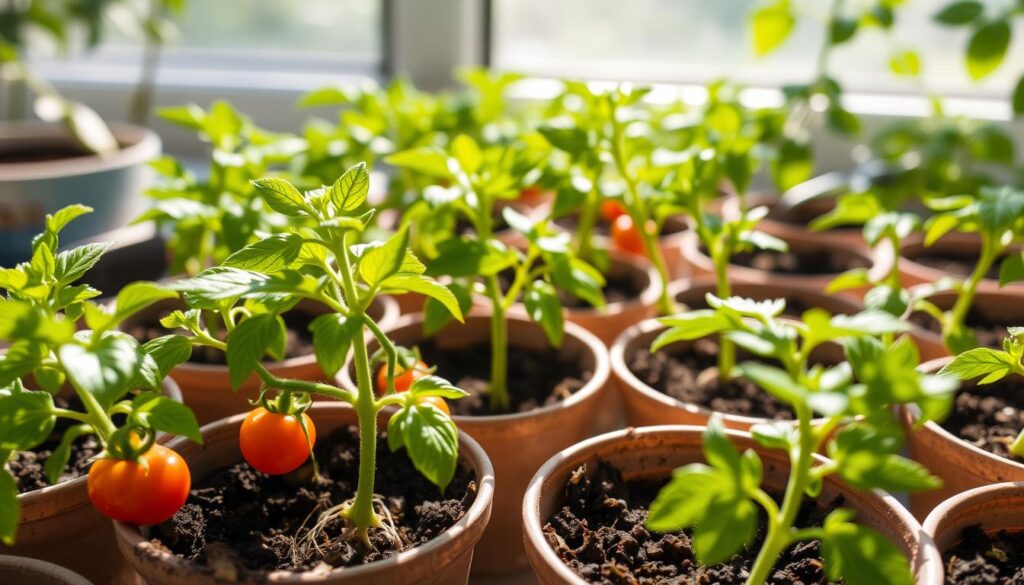
Here’s a quick guide on how to grow cherry tomatoes from seeds to mature plants:
- Transplant when soil temperature is above 22°C
- Ensure 6-8 hours of full sun daily
- Water consistently, keeping soil moist but not soggy
- Fertilize every 2-4 weeks with a balanced tomato fertilizer
- Provide support structures like trellises or poles
Most cherry tomato varieties are indeterminate, needing lots of space. I check my plants often for any nutrient or pest problems. With the right care, I can harvest ripe cherry tomatoes in 60-80 days after transplanting.
| Growth Stage | Time Frame | Care Tips |
|---|---|---|
| Germination | 6-12 days | Maintain warmth and moisture |
| Seedling | 2-3 weeks | Provide 5-6 hours of sunlight |
| Transplanting | After last frost | Space plants 18 inches apart |
| Mature Plant | 60-80 days | Regular watering and fertilization |
By following these guidelines, I can grow my cherry tomato plants from tiny seeds to big producers of tasty fruits.
Caring for Your Growing Cherry Tomato Plants
Growing cherry tomatoes from seeds is rewarding. As they grow, they need the right care for a good harvest. I’ll give you tips on supporting your plants, pruning, and solving common problems.
Supporting Your Cherry Tomato Plants
Cherry tomato plants can get quite tall, up to 120-300 cm. To keep them standing tall and healthy, use strong cages or stakes. For trellising, put rows 24 inches and 48 inches apart. This helps with air flow and makes picking easier.
Pruning and Maintenance Tips
Prune your cherry tomato plants a little. Remove any yellow leaves at the bottom to stop diseases from spreading. Keep the soil’s pH between 5.8 and 7.0 for best growth. Water them twice a week and add compost when you plant them. For more help, use nitrogen or compost tea.
Dealing with Common Pests and Diseases
Watch out for fruit cracking from temperature changes or uneven watering. Use natural ways to fight off aphids and whiteflies. Rotate your crops to reduce pests and diseases.
| Cherry Tomato Care | Recommendations |
|---|---|
| Plant Spacing | 18″ apart |
| Row Spacing | 28″ to 32″ apart |
| Soil pH | 5.8 to 7.0 |
| Watering Frequency | Twice a week |
| Fruit Production Start | After 45 days from planting |
Follow these care tips for delicious, homegrown cherry tomatoes. Whether using non-hybrid or hydroponic cherry tomato seeds, the right care leads to success.
Conclusion: Enjoying Your Homegrown Cherry Tomatoes
Growing cherry tomatoes from seeds is a rewarding journey. The right soil is key for a great harvest. Watching my plants grow in 60 to 75 days brings me joy.
My homegrown cherry tomatoes are not just tasty, they’re also healthy. They’re full of vitamin C, potassium, and fiber. They taste sweeter and juicier than store-bought ones.
Gardening has become more than a hobby. It has made me happier, less stressed, and more active. I’ve met other gardeners and shared tips and produce. Growing my own tomatoes has made a big difference in my life and community.
FAQ
What are some popular cherry tomato varieties to grow from seed?
Popular cherry tomato varieties include ‘Amish Salad’, ‘Camp Joy’, ‘Galinas’, ‘Green Grape’, ‘Hawaiian’, ‘Peacevine Cherry’, ‘Riesentraube’, and ‘Sungold’. Each type has its own flavor and growth pattern.
How do I prepare my growing space for cherry tomato seeds?
Start by adding composted poultry manure to the soil. Also, think about using black plastic to control weeds and diseases. The soil should be well-drained and rich in nutrients, with a pH between 6.0 and 6.8.
When is the best time to start cherry tomato seeds indoors?
Begin with cherry tomato seeds 6-8 weeks before your area’s last frost. Keep the soil moist and warm for the best start.
How do I transplant cherry tomato seedlings into the garden?
Move seedlings outside two weeks after the last spring frost, when the soil is warm. Place them 18 inches apart, or group 3-4 per 8-foot panel for vertical support.
What are some tips for supporting and pruning cherry tomato plants?
Use strong cages, stakes, or panels to support the plants. Prune them lightly, removing any yellow leaves at the bottom to stop diseases from spreading.
How do I deal with common pests and diseases in cherry tomato plants?
Keep an eye out for pests and nutrient issues as the plants grow. Use organic ways to fight off aphids, whiteflies, and hornworms. Also, rotate crops and plant companions to reduce problems.
When and how should I harvest cherry tomatoes?
Pick cherry tomatoes when they’re fully colored and a bit soft. Harvesting often helps keep the plants producing more. Store your fresh tomatoes at room temperature, away from sunlight, for the best taste.
